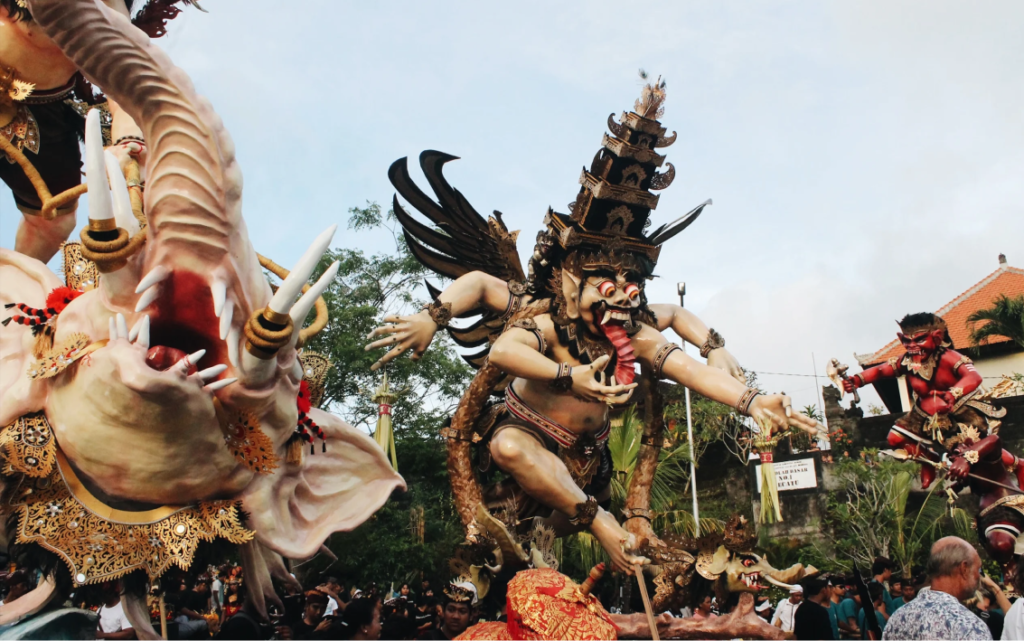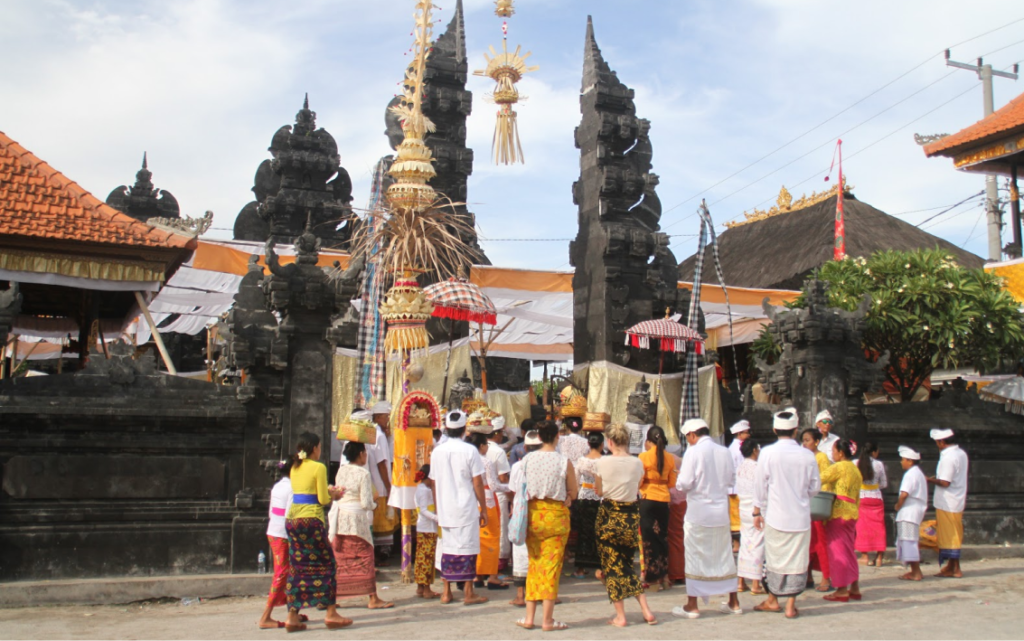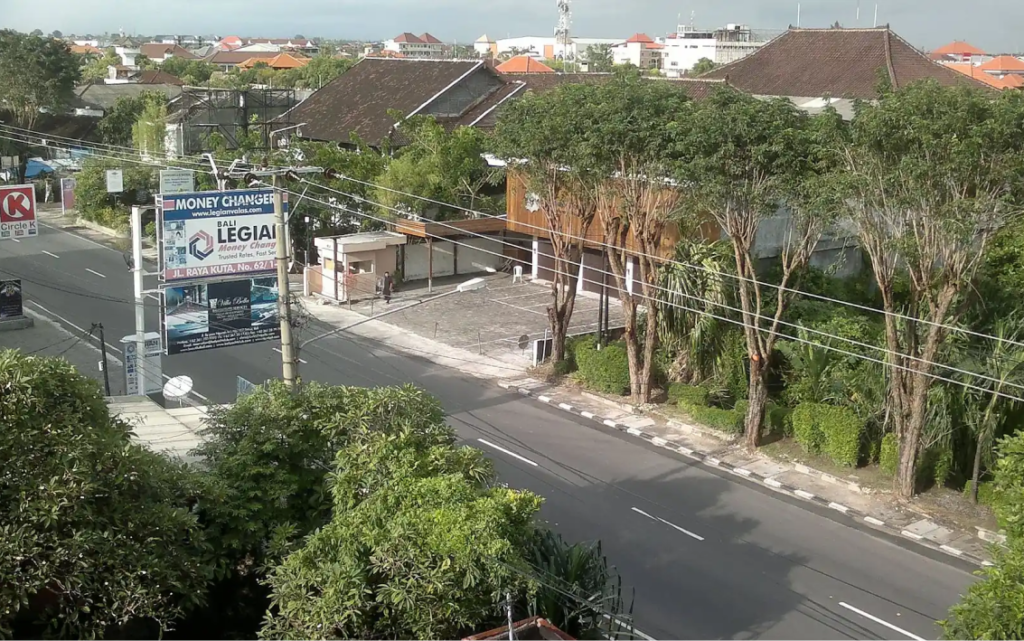Discover Nyepi, Bali’s Day of Silence. Learn about its rituals, pre-Nyepi celebrations, travel tips, restrictions, and how visitors can experience this unique Balinese Hindu tradition in 2025.

What is Nyepi Day?
Nyepi Day, or the Balinese Day of Silence, is Bali’s Hindu New Year. Observed annually, it’s a 24-hour period of quiet reflection, meditation, and spiritual purification. Streets are empty, flights halt, and the island observes darkness. Visitors must remain indoors but can witness pre-Nyepi ceremonies like Ogoh-Ogoh parades and Melasti rituals, making it a unique cultural experience.
As a visitor, it’s a rare opportunity to see Bali in its most peaceful state, allowing you to connect with the island’s culture and spirituality in a way that you wouldn’t otherwise experience. It’s not just the locals who observe Nyepi, but also the expats and travelers. Everyone participates in some form, making it a shared cultural experience.

The Phases of Nyepi Day in Bali
1. Pre-Nyepi: Melasti & Ogoh-Ogoh Parades
Before the stillness of Nyepi sets in, Bali is abuzz with vibrant ceremonies and preparations. The days leading up to Nyepi are marked by the Ogoh-Ogoh parades, one of the most exciting and visually captivating events.
Huge, elaborate effigies representing evil spirits are paraded through the streets in a colorful display of music and dance before being set on fire in a cleansing ritual. As a traveler, this is a great time to witness Bali’s deep-rooted traditions of purification and spirituality.
Another key event leading up to Nyepi is the Melasti ceremony, where locals head to the beach for rituals and prayers. It’s a beautiful and peaceful sight as offerings are made to the sea, symbolizing the cleansing of the mind and soul. If you're lucky enough to be on the beach during these ceremonies, it’s an excellent opportunity to experience the true heart of Balinese culture.
2. Nyepi Day: A Day of Silence
When Nyepi finally arrives, the entire island goes silent. From 6 AM on Nyepi Day until 6 AM the following day, there’s a complete lockdown. The streets are empty, businesses close, and even the airport halts all flights. No one is allowed to leave their homes or accommodations unless it’s an emergency. It’s an almost surreal experience for a traveler, especially if you’re used to Bali’s usual hustle and bustle.
Lights are prohibited as the island goes into total darkness.
During Nyepi, locals take time to reflect and meditate. There are no cars on the roads, no sounds of street vendors or motorbikes, and no parties or celebrations. Instead, the island is at peace, and everything slows down. While it may feel strange at first, it’s a wonderful opportunity to embrace Bali’s more introspective side. You might find that being away from distractions allows you to reconnect with nature, yourself, and the island in a completely new way.
3. Post-Nyepi: The Day After
When Nyepi comes to an end, Bali slowly returns to life. The island gradually shakes off its stillness as businesses reopen and people return to their daily routines. The day after Nyepi is filled with prayer and gratitude as locals give thanks for the new year and offer blessings for a prosperous future. The atmosphere is still calm but welcoming as life picks up again.
Why is Bali dark during Nyepi Day?
The most prominent part of Nyepi Day that makes this holiday iconic is the fact that the island goes into total darkness. No lights, no activities, and no sound. The Balinese Hindu believes that this will confuse the evil spirits into thinking that the island is empty and leave the island.
Your hotels or villas might warn you in advance to keep the curtains or shutters drawn and to turn off all lights that can be seen from the outside during Nyepi Day. Local patrols, or pecalang, will be roaming the streets and might come to remind you if they see any light coming through. Some Balinese will tape up openings and unplug cables to avoid accidental light leaks.
While this might feel strict, it’s part of the island-wide commitment to honoring silence, darkness, and introspection during Nyepi. Most visitors enjoy the silence, a stark contrast to the signature hustle and bustle of Bali. If you're lucky, the night sky might be clear enough for you to stargaze in Bali!

Tips for Travelers Visiting Bali During Nyepi
While Nyepi is an incredible experience, it can also be a bit of a challenge for travelers who aren’t familiar with the customs and restrictions. Here are a few essential tips to help you navigate your Bali adventure during this unique celebration:
1.Plan Ahead for Accommodations
Since Nyepi is a sacred event, most businesses, including restaurants, shops, and tourist attractions, will close for the day. It’s essential to book your accommodations well in advance, ensuring that your hotel or villa is ready for Nyepi. Some accommodations even offer special Nyepi packages that allow guests to experience the day in a spiritual and comfortable way. You might find that some resorts provide activities like yoga, meditation, or spa treatments to help guests make the most of the peaceful atmosphere.
2.Stock Up on Essentials
Because shops and restaurants will be closed during Nyepi, it’s wise to stock up on food, snacks, and other necessities before the day arrives. Make sure you have enough supplies to keep you comfortable, especially if you're staying in a more remote area. You’ll want to plan your meals in advance and bring some drinks and snacks to avoid any inconvenience during the 24 hours of silence.
Tip: Get your groceries a few days before the eve of Nyepi Day, as markets and shops will get crowded with last-minute shoppers. Focus on essentials—there’s no need to panic buy, since Nyepi only lasts for 24 hours. By the next morning, businesses and daily routines return to normal.
3.Respect Local Customs
Nyepi is not just a day of silence—it’s a deeply spiritual day for the people of Bali. It’s crucial to be respectful of their traditions and avoid loud noises, parties, or public gatherings. If you're staying in a hotel or villa, make sure to follow any guidelines they have for Nyepi. You are required to stay indoors for the duration of the day and keep noise levels to a minimum.
4.No Flights During Nyepi
The Ngurah Rai International Airport is closed on Nyepi Day, and no flights are allowed to land or take off. So if you’re planning to arrive or leave Bali around this time, make sure to adjust your travel schedule to avoid any issues. Flights will operate before and after Nyepi, but you’ll want to ensure you’re not caught with a flight during the 24-hour period.
5.Embrace the Stillness
Instead of viewing Nyepi as a day of restrictions, try to see it as a gift. It’s a rare opportunity to experience Bali in a way few travelers ever will. Take the time to reflect, meditate, or simply rest. It’s an incredibly peaceful experience that can leave you with lasting memories of the island’s serene beauty.
FAQ about Nyepi Day
When is Nyepi Day 2026?
Nyepi Day 2026 will occur on Thu, Mar 19, 2026, 5:59 AM – Fri, Mar 20, 2026, 6:00 AM
Can tourists go outside during Nyepi Day?
No, tourists and locals are not allowed to leave their hotels, villas, or accommodations. Local patrols will be monitoring and reprimanding tourists who disobey the rules.
What happens at Bali Airport during Nyepi Day?
Ngurah Rai International Airport will be completely closed for 24 hours, starting from 6:00 AM on Nyepi Day until 6:00 AM the following morning. No flights—domestic or international—are allowed to operate during this period, except for medical emergencies.
Are hotels open during Nyepi Day?
No guests can come in and out of the hotel, but facilities and amenities inside hotels are still open for staying guests. There might even be special activities planned within the hotel area.
Are hospitals open during Nyepi Day
Yes. While the entire island shuts down for Nyepi, hospitals and essential services remain open to ensure public safety. Emergency cases are still treated, and ambulances are allowed on the road if needed. Pharmacies attached to hospitals may also operate, but expect most standalone clinics, shops, and regular businesses to be closed until Nyepi ends the next morning.

Conclusion
Experiencing Nyepi Day in Bali is a once-in-a-lifetime opportunity to witness a unique cultural and spiritual tradition. It’s a time for peace, reflection, and renewal, providing travelers with a chance to connect with Bali’s deep-rooted customs and traditions. By understanding the significance of Nyepi and preparing in advance, you can embrace the stillness and make the most of this unforgettable moment in Bali. Whether you choose to join in the local ceremonies or simply reflect in the quiet, Nyepi is an experience you’ll cherish forever.
Categories: About Bali, Plan Your Trip, Things to Do, Traditions
